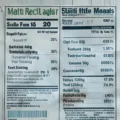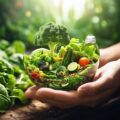Understanding Food Labels: Decoding “Cage-Free” and Other Claims
When you’re strolling down the grocery store aisles, you’re likely to encounter a variety of labels on food products, especially on eggs and poultry. Terms like “cage-free,” “free-range,” and “pasture-raised” might catch your eye, but what do they really mean? As consumers become more conscious about animal welfare and the quality of their food, it’s important to understand these labels to make informed choices that align with our values and health goals.
In this guide, we’ll demystify common food labels, with a special focus on “cage-free” and other similar terms. We’ll explore what these labels mean for animal welfare, product quality, and your health. By the end of this article, you’ll be equipped to navigate the supermarket with confidence, making choices that are good for you, the animals, and the planet.
The Meaning Behind “Cage-Free”
Let’s start with one of the most common labels you’ll see on egg cartons: “cage-free.” This term specifically refers to hens that are not kept in cages. Instead, they are free to roam within an enclosed area, usually a large barn or poultry house. While this is certainly an improvement over traditional battery cages, it’s important to note that “cage-free” doesn’t necessarily mean the hens have access to the outdoors.
Cage-free environments allow hens to engage in natural behaviors like walking, spreading their wings, and laying eggs in nests. However, the amount of space per hen can vary, and these environments can still be quite crowded. While cage-free systems are a step in the right direction for animal welfare, they’re not perfect and may still have limitations in terms of the hens’ quality of life.
Beyond Cage-Free: Understanding Other Common Labels
While “cage-free” is a start, there are other labels that indicate even better conditions for hens and other farm animals. Let’s explore some of these:
- Free-Range: This label means that in addition to being cage-free, the animals have access to the outdoors. However, the quality and duration of outdoor access can vary widely.
- Pasture-Raised: This is often considered the gold standard for animal welfare. Pasture-raised animals spend most of their time outdoors, with access to shelter when needed.
- Organic: While primarily focused on the use of organic feed and the absence of antibiotics and hormones, organic certification also includes some animal welfare standards.
- Certified Humane: This third-party certification ensures that animals are raised according to specific welfare standards, which go beyond many government regulations.
Understanding these labels can help you make choices that align with your values regarding animal welfare and environmental sustainability.
The Impact on Animal Welfare and Product Quality
The conditions in which animals are raised don’t just affect their welfare; they can also impact the quality of the products we consume. For example, eggs from pasture-raised hens have been found to have higher levels of vitamins and omega-3 fatty acids compared to conventional eggs. Similarly, meat from animals raised in more humane conditions often has better flavor and texture.
Moreover, better living conditions for animals can lead to reduced stress, which in turn can result in healthier animals that require fewer antibiotics. This is not only better for the animals but also for human health, as it helps combat the growing problem of antibiotic resistance.
By choosing products with labels that indicate higher welfare standards, we’re not just supporting better lives for animals; we’re also potentially getting higher quality, more nutritious food for ourselves and our families.
Making Informed Choices at the Grocery Store
Armed with this knowledge about food labels, you can now make more informed decisions when shopping. Here are some tips to help you navigate the grocery store:
- Look beyond just one label. For example, eggs might be both cage-free and organic.
- Consider your priorities. If animal welfare is your top concern, look for pasture-raised or Certified Humane products.
- Don’t be afraid to do more research. Many companies provide additional information about their farming practices on their websites.
- Remember that higher welfare standards often come with a higher price tag. If budget is a concern, prioritize which products are most important to you.
- Support local farmers when possible. Visiting farmers’ markets or joining a CSA can give you direct insight into how animals are raised.
By making conscious choices, we can support farming practices that are better for animals, the environment, and our health.
The Bigger Picture: Sustainability and Compassion
Understanding food labels is about more than just knowing what we’re eating; it’s about being part of a larger movement towards more sustainable and compassionate food systems. When we choose products from animals raised in better conditions, we’re voting with our dollars for a world where animal welfare is prioritized.
Moreover, many of the practices that are better for animal welfare are also better for the environment. Pasture-raised animals, for example, can be part of regenerative agriculture systems that help sequester carbon and improve soil health.
By educating ourselves about these labels and making mindful choices, we’re not just improving our own diets – we’re contributing to a more compassionate and sustainable world. Every purchase is an opportunity to support the kind of food system we want to see.
Frequently Asked Questions
1. Are “cage-free” eggs more nutritious than conventional eggs?
While cage-free eggs can be slightly more nutritious due to the hens’ ability to move around more, the most significant nutritional differences are usually seen in pasture-raised eggs, which tend to have higher levels of vitamins and omega-3 fatty acids.
2. Does “free-range” mean the same thing for chickens and cows?
Not necessarily. The term “free-range” is more commonly used for poultry and eggs, while for cows, terms like “grass-fed” or “pasture-raised” are more common. Always check the specific standards for each type of animal product.
3. Are all organic products automatically humane?
While organic certification does include some animal welfare standards, it’s primarily focused on the use of organic feed and the absence of antibiotics and hormones. For the highest animal welfare standards, look for additional certifications like Certified Humane or Animal Welfare Approved.
4. How can I find out more about a company’s animal welfare practices?
Many companies provide information about their farming practices on their websites. You can also look for third-party certifications, or reach out to the company directly with your questions.
5. Is it worth paying more for products with better animal welfare labels?
This is a personal decision that depends on your values and budget. Many people find that the benefits in terms of animal welfare, environmental sustainability, and potential health benefits make the extra cost worthwhile. If budget is a concern, you might choose to prioritize certain products over others.









